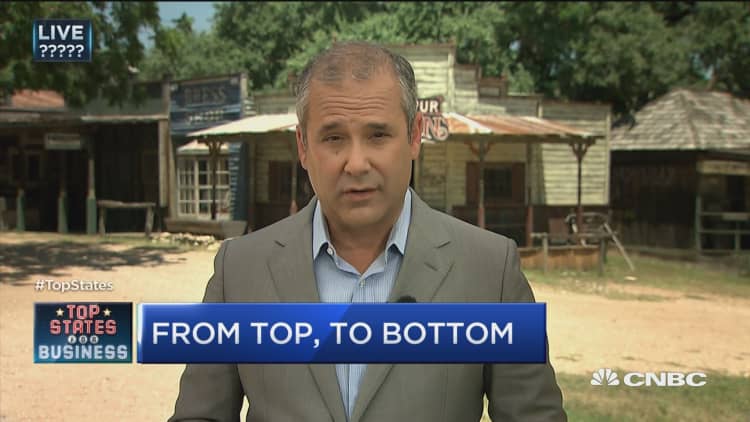
"It's not the same state that you may have written about in the past," said Rhode Island Gov. Gina Raimondo in a phone call last week.
She did not know at the time that we were about to name Rhode Island America's Bottom State for Business in our 10th annual rankings — the fourth time it would come in dead last. But she was also under no illusions that her state's standing was suddenly about to change for the better compared to previous years.
After all, Rhode Island has never finished better than 48th since we began rating the states in 2007. But Raimondo, a Democrat who is one year into her first term, wanted us to know about some of the things her administration is doing to try and turn things around.
"Take a fresh look at Rhode Island," she said. That was all she was asking.
Indeed, some of her initiatives take direct aim at the very issues that make Rhode Island this year's bottom state and which have hurt the state year after year. These include financial woes, crumbling infrastructure and a talent drain.
For example, Rhode Island ranks dead last in our Infrastructure category this year, in large part because it has a greater percentage of deficient bridges than any other state. Now there is a plan to change that.
"We are completely remaking our transportation system," the governor said. Raimondo is referring to an infrastructure package passed this year known as RhodeWorks, which the administration says will provide $45 million a year in revenue to fix roads and bridges.
At the heart of the package — which is aimed at returning the bridges to "90 percent sufficiency" within 10 years — are new tolls on large commercial trucks. Rhode Island had been one of the only states in the Northeast that did not levy fees. Cars and smaller trucks are exempt.
The state is also leveraging federal funds to redevelop its ports, and the legislature approved $1.5 million to subsidize commercial air routes serving the state's main airport, T.F. Green Airport, near Providence.
"The combination of funding for our ports, airports and highways is a really significant investment in our infrastructure," Raimondo said.
In the Workforce category, Rhode Island ties for 23rd place with Nevada. But the state would do much better were it not for a brain drain in which hundreds of college students every year are leaving after they graduate. Our Top States analysis of Census Bureau figures ranks Rhode Island near the bottom for net migration.
Enter a $1.75 million program called the Wave Maker Fellowship.
Graduates from Rhode Island institutions with designated degrees in science, technology, engineering, art or math who get a job in the state within those fields can qualify for four years of assistance paying back their student loans.
At the K–12 level, Raimondo points to a new partnership with Microsoft to teach computer science in every school in the state.
Rhode Island ranks 45th in Economy in our study this year. State GDP grew just 1.7 percent last year, to around $50 billion. The state has a long history of financial woes, including a pension that was underfunded by nearly $9 billion as recently as 2011.
But by the end of last year, those unfunded liabilities had been cut nearly in half to around $4.8 billion, according to the state treasurer's office. Raimondo points to sweeping reforms — she was state treasurer before she was elected governor — including switching from defined-benefit retirement plans to defined contribution plans.
To hear the governor tell it, Rhode Island is just a few years away from becoming a little business powerhouse.
These big changes, she contends, "will make it cheaper and more attractive to do business here."
But Raimondo is not the first Rhode Island governor to claim that the state has turned over a new leaf.
Her predecessor, Lincoln Chafee, laid out some bold pronouncements of his own in a commentary for our 2013 America's Top States for Business coverage.
"We're capitalizing on our assets and building world-class infrastructure. We're working diligently to educate a 21st-century workforce. We're leading a state government that will help businesses in our state grow and succeed," he wrote.
Earlier that year, the state Senate Policy Office had issued a series of recommendations in a report entitled "Moving the Needle" — the needle being our Top States for Business rankings and other competitiveness studies that consistently put Rhode Island near the bottom.
Chafee signed more than two-dozen pieces of legislation recommended in the report, including regulatory reform, workforce development and tax relief. But the needle hasn't budged.
"I'm committed to structural changes," Raimondo said.
But she admitted, "It's a process."






